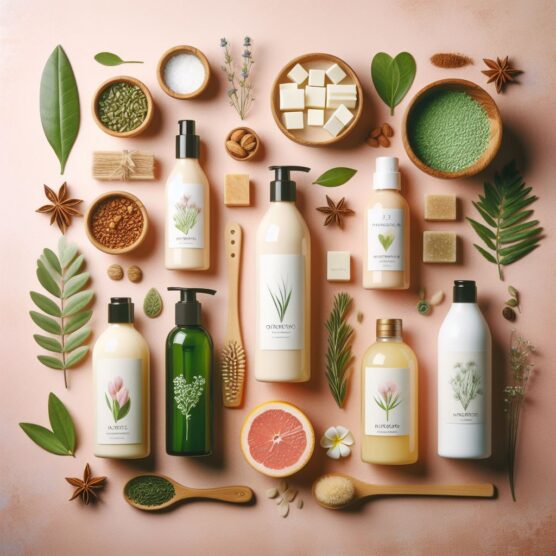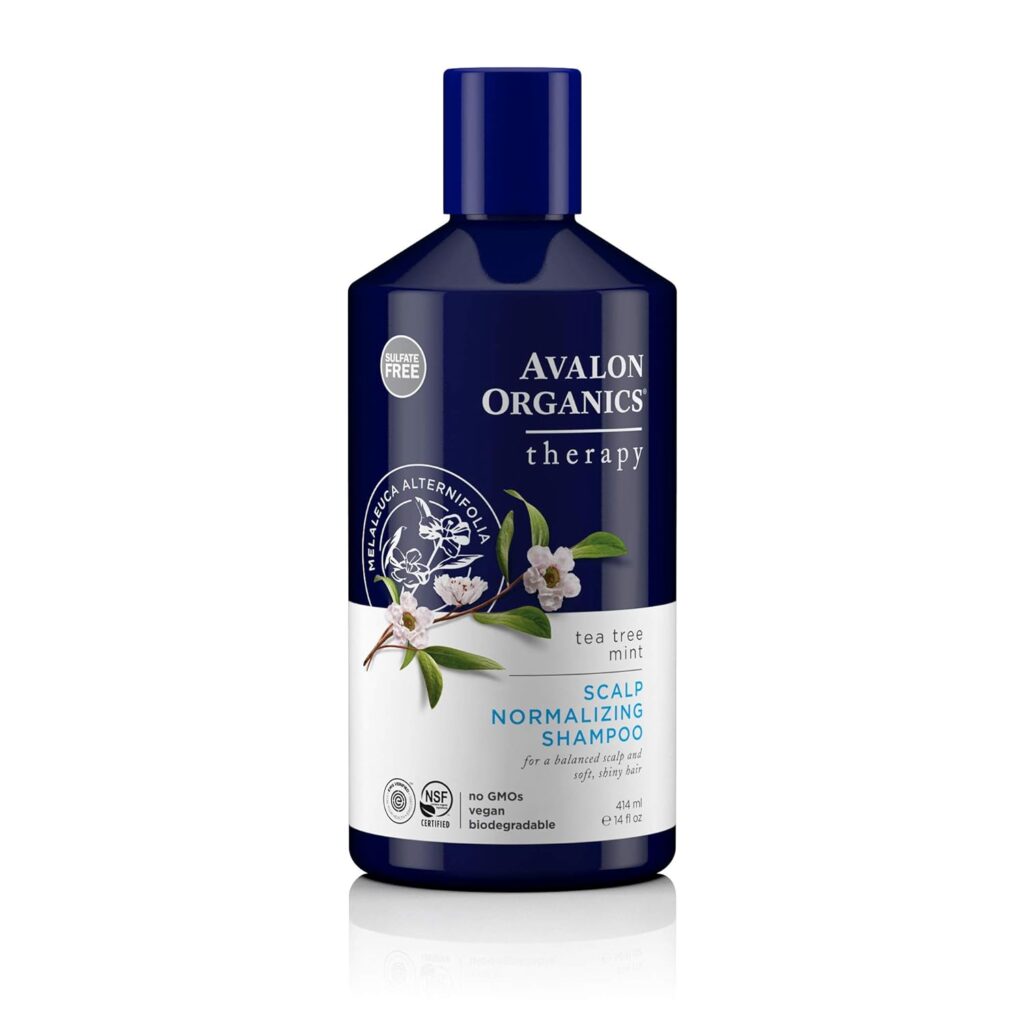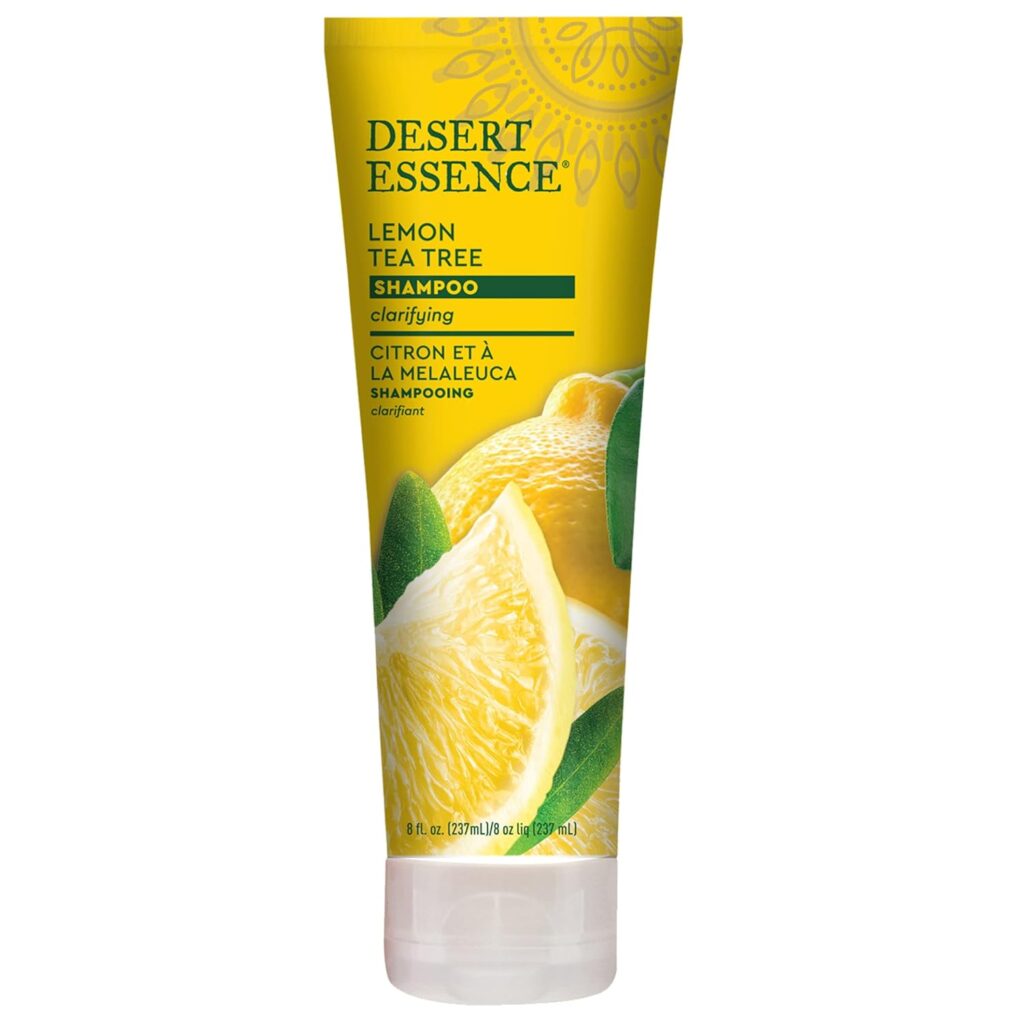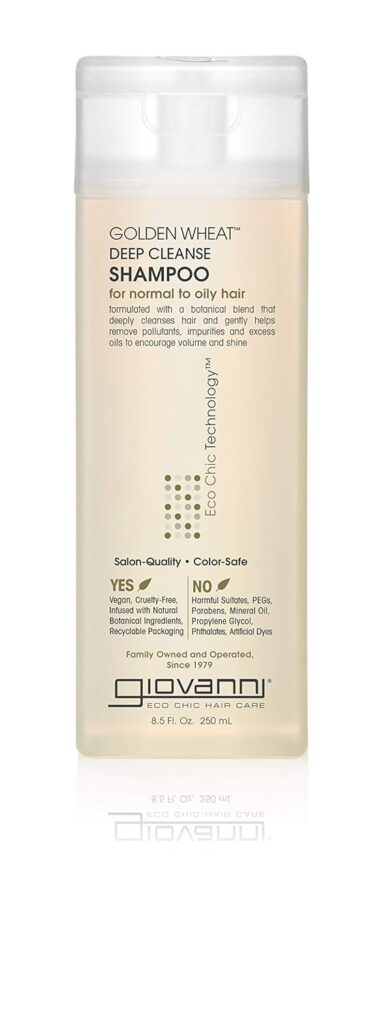Tired of promises of shiny, healthy hair that never quite happens? Wondering if going natural could be the key to hair you truly love? You’re not alone! The good news is, that organic haircare offers a gentler path to gorgeous hair. But it can be confusing with so many products out there.
Don’t worry, we’ve got you covered. In this guide, we’ll break down the science behind organic shampoos and help you find the perfect match for your hair type and concerns. Get ready to say goodbye to dryness, frizz, and harsh chemicals, and hello to soft, strong, naturally beautiful hair!
Why Trust Us?
Everything we share is backed by research (we’ll provide the links!) so you can make informed, confident choices. Let’s get started on this exciting journey to healthier, happier hair!
Table of Contents
Deciphering Your Hair Type: The Key to the Best Organic Shampoo
Picture this: you’re browsing for the ideal organic shampoo, but the sheer volume of options makes your head spin. The secret to finding your perfect match? Understanding your hair’s unique personality! Let’s break down the key questions to ask yourself to unlock your hair’s true needs.
Question 1: Is My Hair Oily, Dry, or Normal?
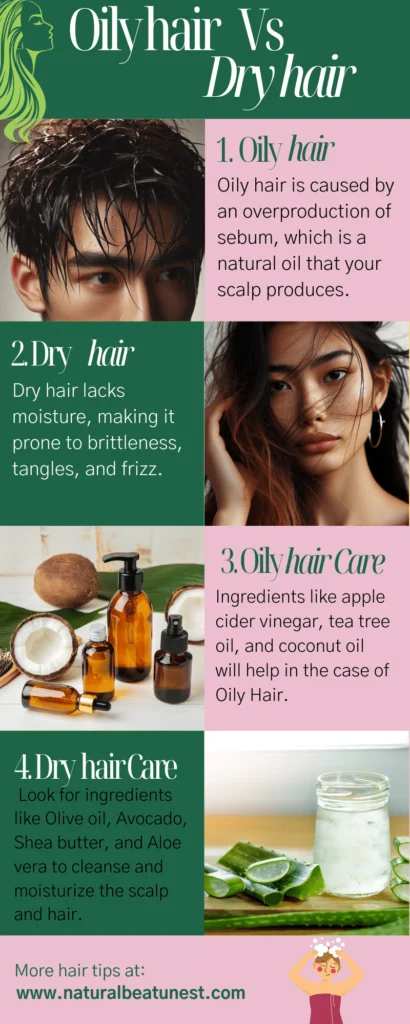
- Oily Hair: The Overachiever: For individuals with oily hair, the scalp’s overproduction of sebum can lead to greasy roots shortly after washing. Organic shampoos tailored for oily hair can help restore balance without harsh chemicals. Aveeno Scalp Soothing Shampoo and ACURE Curiously Clarifying Shampoo are examples of organic options that effectively cleanse and balance oily hair. These shampoos often contain natural ingredients like apple cider vinegar, tea tree oil, and coconut oil, known for their clarifying and oil-balancing properties. Organic shampoos for oily hair aim to remove excess oil without stripping the scalp, promoting a healthier scalp environment.
- Dry Hair: The Desert Plant: Dry hair lacks moisture, leading to brittleness, tangles, and frizz. Organic shampoos designed for dry hair are enriched with hydrating and nourishing ingredients to address these issues. Look for ingredients like Olive oil, Avocado, Shea butter, and Aloe vera to cleanse and moisturize the scalp and hair. These shampoos focus on replenishing moisture levels in the hair, improving its texture, and combating dryness effectively. GIOVANNI 2chic Ultra-Moist Shampoo is a good option for dry hair that contains Aloe Vera and Shea Butter.
- Normal Hair: The Goldilocks Zone: Maintaining the healthy balance of normal hair is essential to preserve its natural state. While not too oily or dry, normal hair benefits from gentle care. INNERSENSE Organic Beauty – Natural Pure Harmony Hairbath Shampoo is an organic option suitable for normal or greasy hair, containing organic coconut, rice bran, and avocado oils to leave the hair healthy-looking and soft. Organic shampoos for normal hair focus on gentle cleansing without harsh chemicals, helping to maintain the natural balance of the hair.
Question 2: Is My Hair Fine, Thick, or Somewhere in Between?
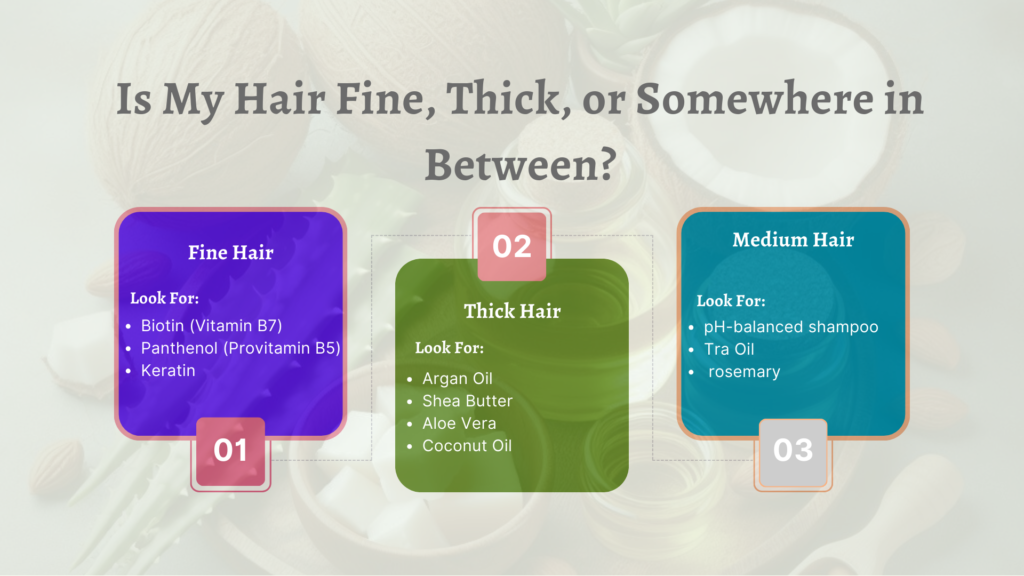
- Fine Hair: The Quest for Weightless Volume
- The Challenge: Fine hair strands have a smaller diameter, meaning less inherent volume and a tendency to fall flat. Heavy products can worsen this, leaving hair looking limp.
- The Organic Solution: Look for volumizing organic shampoos with ingredients proven to boost lift without buildup:
- Biotin (Vitamin B7): Strengthens hair follicles and may support a healthy growth cycle, contributing to a fuller appearance (source: https://www.ncbi.nlm.nih.gov/pmc/articles/PMC5582478/).
- Panthenol (Provitamin B5): Adds lightweight moisture while thickening the appearance of hair strands (source: https://www.ncbi.nlm.nih.gov/pmc/articles/PMC7466645/).
- Keratin: This naturally occurring protein builds hair structure, leading to a fuller-looking mane.
- Ingredients to Avoid: Steer clear of heavy silicones and oils that can weigh down fine strands.
- Thick Hair: Taming the Lush Mane
- The Challenge: Thick hair boasts enviable volume but can be prone to frizz and dryness due to its density. Traditional shampoos may strip away essential moisture, making it unmanageable.
- The Organic Solution: Aim for deeply moisturizing organic shampoos with ingredients that lock in hydration and combat frizz:
- Argan Oil: Rich in Vitamin E and fatty acids, this oil provides intense nourishment and improves hair elasticity (source: https://pubmed.ncbi.nlm.nih.gov/25382486/).
- Coconut Oil: Penetrates the hair shaft for deep hydration, smoothing frizz and adding shine (source: https://pubmed.ncbi.nlm.nih.gov/12715094/).
- Shea Butter: A potent moisturizer that seals in hydration and helps protect thick hair from breakage.
- Aloe Vera: Soothing and lightweight, aloe vera combats scalp dryness associated with thicker hair, enhancing manageability.
- Note on Hair Growth: While healthy ingredients promote strong hair, be wary of shampoos making bold hair growth claims. Focus on a healthy scalp and manageable hair as primary goals.
- Medium-Texture Hair: The Adaptable Choice
- The Advantage: Medium hair is the most versatile – the focus shifts to your primary hair concerns, such as oiliness, dryness, or dandruff.
- The Organic Solution: Since you have flexibility, target specific needs with these organic solutions:
- Oily Scalp: A pH-balanced shampoo with tea tree oil or rosemary helps regulate oil production and gently clarifies (source: https://pubmed.ncbi.nlm.nih.gov/22998411/).
- Dry Scalp: Look for hydrating ingredients like aloe vera, jojoba oil, and honey to soothe and nourish a dry, flaky scalp.
- Dandruff: Seek natural, clarifying shampoos that contain neem oil or chamomile to combat the flaking and irritation associated with dandruff.
- Universal Truths for Healthy Hair:
- Scalp First: A healthy scalp is the foundation for beautiful hair, regardless of texture! Organic shampoos often focus on gentle, scalp-balancing ingredients.
- Less is More: Even with organic options, use a moderate amount and avoid over-washing, which can strip away natural oils.
- Listen to Your Hair: Everyone’s hair responds differently. Pay attention to how your hair feels after using a new shampoo—that’s the ultimate guide!
Question 3: Do I Have Any Specific Scalp Concerns?
- Dandruff: The Flaky Foe
- Understanding the Issue: Dandruff isn’t just about flakes; it’s often caused by a naturally occurring fungus on the scalp called Malassezia. In some people, this fungus irritates the scalp, leading to excess skin cell shedding and those telltale flakes.
- The Organic Arsenal: Look for organic shampoos with proven anti-dandruff ingredients:
- Tea Tree Oil: Known for its anti-fungal and anti-inflammatory properties, it helps combat Malassezia and soothe scalp irritation (source: https://www.ncbi.nlm.nih.gov/pmc/articles/PMC3491990/).
- Zinc Pyrithione: An FDA-approved anti-dandruff agent that effectively controls fungal growth and reduces flaking.
- Salicylic Acid: Helps to gently exfoliate the scalp, removing dead skin cells and buildup that can worsen dandruff.
- Sensitive Scalp: The Delicate Flower
- The Culprits: Harsh sulfates, synthetic fragrances, and other irritants in conventional shampoos can strip the scalp’s natural oils, leading to inflammation, redness, and itchiness.
- The Soothing Solution: Switch to organic shampoos specifically designed for sensitive scalps. Seek out these calming ingredients:
- Aloe Vera: This natural wonder is known for its anti-inflammatory and hydrating effects, ideal for calming scalp irritation (https://www.ncbi.nlm.nih.gov/pmc/articles/PMC2763764/).
- Chamomile: Contains potent anti-inflammatory compounds to soothe redness and provide a comforting sensation to the scalp (https://www.ncbi.nlm.nih.gov/pmc/articles/PMC2995283/).
- Oatmeal: A natural moisturizer and skin protectant that can help alleviate itchiness and maintain scalp health.
- Important Notes:
- Severe Dandruff: If your dandruff is severe or doesn’t improve with organic shampoos, consult a dermatologist for personalized advice.
- Patch Testing: Introduce new products gradually, especially with a sensitive scalp, to ensure you don’t have any adverse reactions.
Question 4: Is My Hair Curly, Wavy, Coily, or Straight?
- Straight Hair: The Smooth Waterfall
- The Structure: Straight hair follicles are perfectly round, allowing hair to lie smoothly without bends or curves. This can lead to a sleek appearance but also a tendency towards oiliness, as sebum (natural oil) travels easily down the hair shaft.
- The Challenges: Lack of natural volume, excess oil at the scalp, and a tendency to look limp are common concerns for those with straight hair.
- The Solutions:
- Focus on the scalp: Opt for clarifying, volumizing shampoos to remove excess oil. Look for ingredients like tea tree oil or rosemary to help balance your scalp.
- Lightweight formulas are key: Steer clear of heavy products that will weigh your hair down.
- Bonus Tip: Dry shampoo can be your best friend, absorbing oil between washes and adding a bit of lift.
- Wavy Hair: The Ocean Flow
- The Pattern: Your hair follows a gentle S-shaped pattern, adding movement and texture. Wavy hair sits between straight and curly, offering a beautiful balance.
- The Challenges: Wavy hair can be prone to frizz and an undefined wave pattern. Finding the right balance of moisture and styling products is important.
- The Solutions:
- Gentle hydration is essential: Choose shampoos with moisturizing ingredients but avoid overly heavy formulas that might weigh down your waves.
- Define and fight frizz: Use styling products like leave-in conditioners or light gels to enhance your wave pattern and combat frizz.
- Curly Hair: The Bouncy Springs
- The Structure: Curly hair follicles are oval-shaped, creating those beautiful spirals and ringlets. This type has a unique texture that gives it energy and bounce!
- The Challenges: Curly hair tends to be naturally dry, as the spiral shape makes it harder for scalp oils to travel down the strand. This can lead to frizz and a lack of definition.
- The Solutions:
- Moisture is your mantra: Focus on deeply hydrating shampoos and conditioners. Ingredients like shea butter, coconut oil, and argan oil are excellent choices.
- Embrace definition: Use styling creams and gels to shape your curls and minimize frizz. Look for products with natural hold and moisturizing properties.
- Coily Hair: The Tightly Wound Wire
- The Pattern: Coily hair follicles have a flattened, highly elliptical shape, creating a tight Z-pattern. This unique structure leads to beautiful, springy coils and striking shrinkage when dry.
- The Challenges: Coily hair is the most prone to dryness, due to the tight curl pattern that prevents natural oils from reaching the ends. Defined coils might also require some coaxing.
- The Solutions:
- Intense Moisture: Deep conditioners are essential! Look for products rich in butters (shea, mango) and oils (coconut, argan), to give your hair long-lasting hydration.
- Styling with intention: Styling products formulated for coils will help define your gorgeous curls while keeping them moisturized.
Remember: Everyone's hair is a unique masterpiece! Experiment and embrace your hair's individual needs to find that perfect organic shampoo match.
Ingredient Power: What to Look For (and What to Avoid)
Deciphering a shampoo’s ingredient list can feel like learning a foreign language. But fear not, we’ll turn you into a fluent ingredient detective! Understanding what goes into your organic shampoo is key to finding one who loves your hair.
The Superstars: Beneficial Ingredients for Different Hair Types
- Dry Hair’s Delight:
- Aloe Vera: This succulent super-ingredient is packed with vitamins, enzymes, and polysaccharides that deeply hydrate and soothe dry, brittle hair. It helps to seal in moisture and improve hair elasticity (source: https://www.ncbi.nlm.nih.gov/pmc/articles/PMC2763764/).
- Argan Oil: Rich in fatty acids and Vitamin E, argan oil is known as “liquid gold” for hair. It smooths the hair cuticle, improves shine, and fights frizz for a softer, more manageable mane (source: https://pubmed.ncbi.nlm.nih.gov/25382486/).
- Coconut Oil: Penetrates the hair shaft for deep conditioning and has been shown to reduce protein loss in damaged and undamaged hair, promoting stronger strands (source: https://pubmed.ncbi.nlm.nih.gov/12715094/).
- Shea Butter: A natural sealant jam-packed with fatty acids, shea butter is a luxurious moisturizer. It protects dry hair from breakage and helps lock in long-lasting moisture.
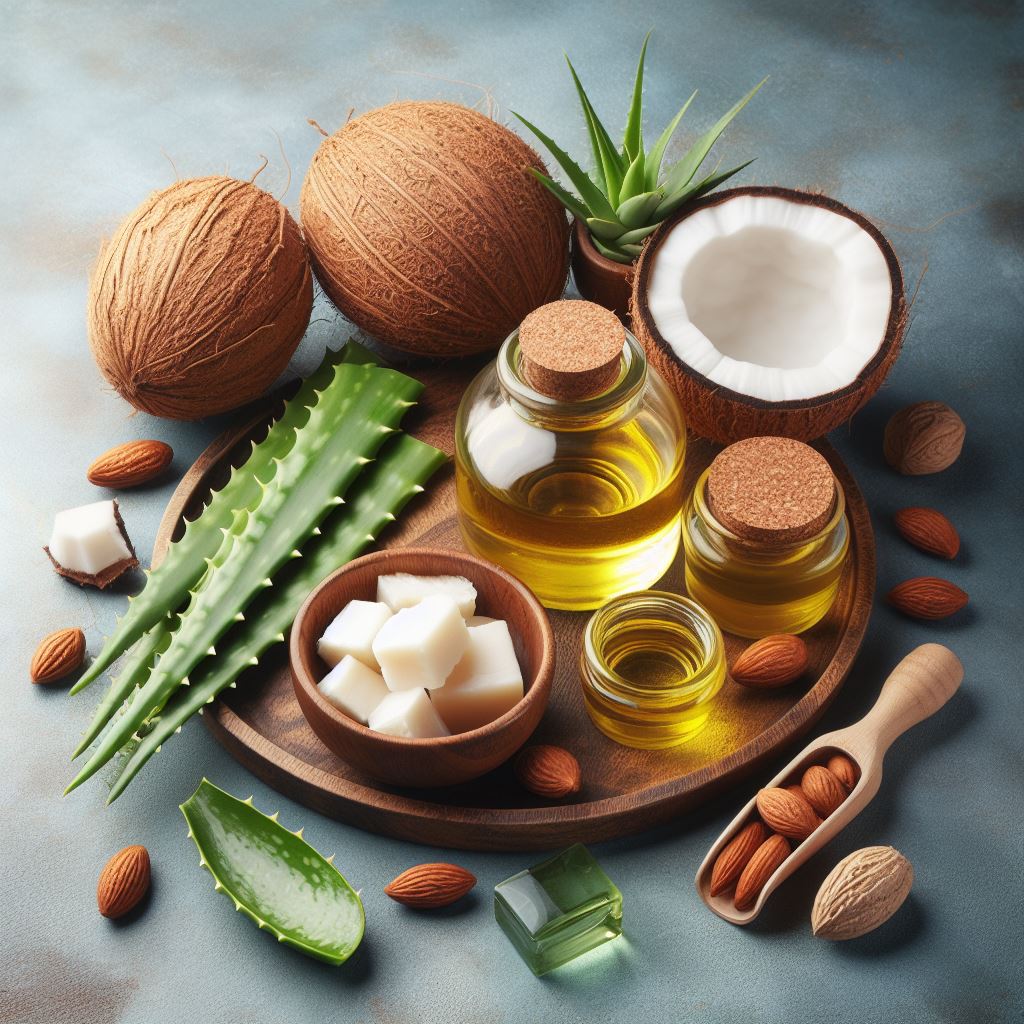
- Oily Hair’s Savior:
- Tea Tree Oil: Has both antifungal and antibacterial properties, helping to control excess oil production and soothe itchy scalps (source: https://www.ncbi.nlm.nih.gov/pmc/articles/PMC3491990/).
- Rosemary: A fragrant herb with antioxidant and antimicrobial properties. It stimulates scalp circulation and helps to balance oil production (https://pubmed.ncbi.nlm.nih.gov/22517595/).
- Citrus Extracts: Rich in Vitamin C and other clarifying agents, citrus extracts help remove buildup and leave the scalp feeling refreshed, without stripping it completely of natural oils.

- Dandruff Fighters:
- Zinc Pyrithione: An FDA-approved anti-dandruff agent. Its dual antifungal and antibacterial action helps to control the fungus Malassezia, a common cause of flaking and irritation.
- Tea Tree Oil: Repetitive, but for good reason! Its antifungal properties help address dandruff and its anti-inflammatory effect soothes the scalp (https://www.ncbi.nlm.nih.gov/pmc/articles/PMC3491990/).
- Curly Hair’s Best Friends:
- Glycerin: A humectant, meaning it attracts and retains moisture from the air. This is perfect for curly hair, helping to keep it hydrated, fight frizz, and define curls (https://pubmed.ncbi.nlm.nih.gov/19167744/).
- Avocado Oil: Rich in oleic acid, a fatty acid that penetrates the hair shaft for deep nourishment. It softens and adds shine to curly and coily hair.
- Jojoba Oil: Mimics the natural oils (sebum) produced by our scalp, making it an excellent moisturizer for curly hair. It’s lightweight, reducing the chance of weighing down those beautiful spirals.

The Troublemakers: Common Irritants to Avoid
- Sulfates (SLS, SLES): The Stripping Agents
- The Function: Sodium Lauryl Sulfate (SLS) and Sodium Laureth Sulfate (SLES) are powerful detergents that create that satisfying, foamy lather. They’re great at removing dirt and oil, but too great.
- The Damage: Sulfates strip away your hair’s natural oils, leaving it dry, brittle, and prone to breakage. They can also irritate the scalp, particularly for people with sensitive skin or conditions like eczema (source: https://www.healthline.com/health/beauty-skin-care/shampoo-ingredients-to-avoid).
- Parabens: The Questionable Preservatives
- The Function: Parabens are a group of preservatives that prevent the growth of bacteria and mold in your shampoo. They’re used widely and considered generally safe in small amounts.
- The Concerns: Some research suggests potential links between parabens and hormone disruption or increased risk of certain cancers. While the science isn’t fully conclusive, there are many paraben-free options available (source: [invalid URL removed]).
- Phthalates: The Hidden Hormone Disruptors
- The Function: Phthalates are a class of chemicals used to make plastic more flexible, and they often sneak into shampoos within “fragrance” blends.
- The Concerns: Some phthalates have been classified as endocrine disruptors, meaning they can interfere with your body’s hormone system. This is particularly concerning for pregnant women and children (source: https://www.niehs.nih.gov/health/topics/agents/endocrine/index.cfm).
- Synthetic Fragrances: The Irritating Imposters
- The Function: Synthetic fragrances mask the natural smell of product ingredients and make your shampoo smell like a tropical vacation (or something else appealing).
- The Concerns: “Fragrance” is a catch-all term that can encompass hundreds of different chemicals, including potential allergens and irritants. For those with sensitive skin, synthetic fragrances are a major culprit when it comes to scalp irritation or flare-ups.
- Empowering Choices:
- Read the Labels: Get familiar with ingredient lists and learn to identify common troublemakers and their sneaky aliases.
- Opt for Unscented or Naturally Scented: If you’re sensitive, seek out fragrance-free shampoos or those with essential oils (but always patch test first!).
- “Sulfate-Free” Isn’t a Free Pass: Check the whole ingredient list, as some sulfate-free shampoos may contain other harsh detergents.
Understanding the Difference: Organic vs. Natural Shampoos
When you see “organic” and “natural” on shampoo bottles, knowing what they really mean can be confusing. Here’s the breakdown:
- Organic Shampoos: These are the strictest category. They’re made with ingredients grown without harsh pesticides or fertilizers. Think of them as the superstars of clean hair care!
- Natural Shampoos: These contain mostly ingredients from nature, but some synthetic (man-made) ones might be mixed in. The downside? There’s no official rulebook for what counts as “natural.”The term “natural” is not regulated by the FDA and can be used even if only a small percentage of the ingredients are natural.
Spotting the real deal: Certifications, Your Trusty Compass
Navigating “greenwashing” (products misleadingly claiming to be natural) can be tricky. Certifications like USDA Organic, COSMOS, or country-specific standards offer reassurance. These labels mean a product contains a significant percentage of truly organic ingredients.
Matching Ingredients to Your Hair Needs: Real-World Examples
You’ve decoded your hair type, you understand the good and bad ingredients…now the magic happens! Let’s look at some common hair concerns and the organic shampoo formulas that could be your perfect match.
Problem 1: Oily Hair SOS
- Best Organic Shampoo for Oily Hair – Product Picks:
- Avalon Organics Scalp Normalizing Shampoo (Tea Tree Mint): This clarifying shampoo contains tea tree oil to balance oil production, peppermint for a refreshing feel, and aloe vera to soothe the scalp.
- Desert Essence Lemon Tea Tree Shampoo: Desert Essence is a big name and their Lemon Tree Shampoo contains lemon tea tree oil and lemon peel extract to loosen and dissolve excess oil.
- GIOVANNI ECO CHIC Golden Wheat Deep Cleanse Shampoo: GIOVANNI’s Golden Wheat Deep Cleanse Shampoo is ideal for removing excess oils from normal to oily hair, and cleansing the scalp while contributing to beautiful tresses.
Problem 2: Dry Hair’s Desperate Plea
- Best Organic Shampoo for Dry Hair – Product Picks:
- Shea Moisture Raw Shea Butter Moisture Retention Shampoo: Rich with hydrating shea butter, argan oil, and sea kelp to intensely moisturize dry, brittle strands. Perfect for all hair types needing major hydration.
- Innersense Organic Beauty Hydrating Cream Hairbath: A gentle cleanser formulated with rice bran oil, aloe vera, and coconut oil for soft, manageable, and deeply nourished hair.
- Andalou Naturals Argan Oil and Shea Moisture Rich Shampoo: Provides deep conditioning and shine, ideal for combating dryness caused by weather or styling.
Problem 4: The Sensitive Scalp’s Quest
- Best Organic Shampoo for Sensitive Scalp – Product Picks:
- Attitude Super Leaves Nourishing & Strengthening Shampoo: Hypoallergenic, fragrance-free, and packed with soothing and protective ingredients. A great starting point for those with easily irritated scalps.
- Avalon Organics Scalp Treatment Tea Tree Shampoo: A gentle, clarifying shampoo specifically formulated to soothe itchy scalps and promote balance.
Problem 4: Fine Hair Needs Volume
- Best Organic Shampoo for Fine Hair – Product Picks:
- Rahua Voluminous Shampoo: It contains rahua oil to boost volume, a luxurious ingredient that also strengthens hair strands.
- Innersense Organic Beauty Pure Harmony Hairbath: Gentle enough for everyday use, delivers lightweight hydration with aloe vera and rice bran oil, without weighing hair down.
- Acure Vivacious Volume Shampoo: Argan oil and pumpkin seed oil provide lightweight moisture and help hair appear thicker and fuller.
Problem 5: Thick Hair’s Best Friend
- Best Organic Shampoo for Thick Hair – Product Picks:
- Briogeo Don’t Despair, Repair! Deep Conditioning Shampoo: Formulated for dry, damaged hair, this ultra-rich shampoo includes avocado oil, vitamin B5, and algae extract to combat frizz and nourish thick strands.
- 100% Pure Burdock & Neem Healthy Scalp Shampoo: Clarifying and soothing for thick hair prone to scalp buildup, while also promoting healthy hair growth.
- Shea Moisture Coconut and Hibiscus Curl & Shine Shampoo: A perfect choice for thick, curly hair! This intensely moisturizing shampoo provides hydration and definition.
Problem 6: Dandruff Dilemma
- Best Organic Shampoo for Dandruff – Product Picks:
- SheaMoisture Hair Care System Anti-Dandruff Shampoo: This anti-dandruff shampoo contains Apple Cider Vinegar, Vitamin B3, and Salicylic Acid to gently cleanse the scalp, remove build-up, and combat flaking and itching caused by dandruff.
- Jason Dandruff Relief Treatment Shampoo: Crafted with a blend of sulfur, salicylic acid, jojoba, olive, and rosemary oils, this product gently cleanses and nourishes hair while helping to control scalp dermatitis and mild psoriasis.
- Avalon Organics Therapy Medicated Anti-Dandruff Shampoo: This shampoo is formulated with a carefully balanced blend of 2% salicylic acid, aloe vera, tea tree, chamomile, and essential oils. It works in harmony to treat and help prevent dandruff, control scaling, itching, and flaking associated with seborrheic dermatitis, and help condition and nourish hair.
Problem 7: Managing Curly Hair
- Best Organic Shampoo for Curly Hair – Product Picks:
- Shea Moisture Curl and Shine Coconut & Hibiscus Shampoo: Coconut oil and hibiscus define curls, reduce frizz, and bring out natural shine.
- Innersense Organic Beauty Hydrating Hairbath: Gentle enough for daily use, this moisturizing formula features rice bran oil and aloe vera to nourish and combat frizz.
- GIOVANNI Curl Habit Curl Defining Shampoo: Cleanse and hydrate every curl type with moisturizing oils and botanical extracts that magnify and bring ultimate definition to every curl strand and wave.
Problem 7: Straight Hair, Wavy Hair, & Normal Balanced Hair
- Best Organic Shampoo for Straight Hair, Wavy Hair, & Normal Balanced Hair – Product Picks:
- Andalou Naturals Argan Stem Cell Age Defying Shampoo: Hydrating, anti-aging formula with argan oil and fruit stem cells.
- Rahua Classic Shampoo: A versatile, luxurious choice with rahua oil, quinoa, and coconut for gentle cleansing and healthy, balanced hair.
Beyond the Shampoo: Additional Considerations for Your Organic Haircare Journey
You’ve got the right ingredients, and you’ve found your perfect shampoo match – but your journey to healthy, luscious hair doesn’t stop there! Let’s explore some additional factors that play a role in the success of your organic haircare routine.
The Transition Period: Patience is Key
- Why it Happens: Switching from conventional products often means saying goodbye to silicones, which create a false, slippery smoothness, and harsh detergents that strip your hair. Without these, your hair might need time to adjust – its natural oils and texture may resurface.
- Don’t Despair: Temporary dryness or a change in feel is a normal part of the transition. Stick with your organic routine, give your hair time, and trust the power of those natural ingredients to reveal healthier, more vibrant hair in the long run.
Individual Differences Matter
- No One-Size-Fits-All: Genetics, your scalp environment, and even your diet play a role in how your hair looks and feels. What works wonders for someone else might not be your perfect match, and that’s okay!
- Experiment and Enjoy: Embrace the journey of exploration as you try different products and routines. Observe how your hair responds and tailor your choices accordingly.
- Lifestyle Check-In: Hot showers, frequent heat styling, sun exposure, and even your water’s mineral content can impact your hair health. Identify areas where you can make small adjustments for a holistic approach.
Beyond Shampoo: The Power of Complementary Products
Organic haircare extends beyond just your shampoo. Consider these additions to your routine:
- Conditioners: Look for formulas rich in nourishing oils and botanical extracts to match your hair type.
- Hair Masks: A weekly deep conditioning treatment can work wonders, especially for dry or damaged hair.
- Natural Hair Rinses: Apple cider vinegar or a herbal tea rinse can add shine and clarify the scalp.
Gentle Styling: Let Your Hair Breathe
Harsh heat styling and tight hairstyles can compromise your hard work with organic products. Limit heat tools when possible, and opt for gentler styling techniques like braids or air-drying.
Overall Wellness: Beauty from Within
A healthy diet, plenty of water, and managing stress levels all contribute to gorgeous hair. Think of your organic haircare as part of a holistic approach to well-being.
